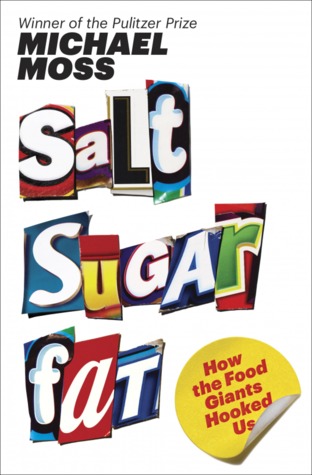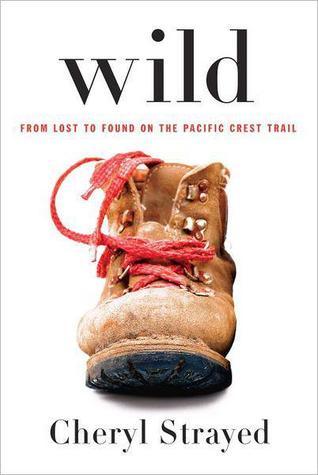 Salt Sugar Fat: How the Food Giants Hooked Us
Salt Sugar Fat: How the Food Giants Hooked Us
by Michael Moss
From a Pulitzer Prize–winning investigative reporter at The New York Times comes the explosive story of the rise of the processed food industry and its link to the emerging obesity epidemic. Michael Moss reveals how companies use salt, sugar, and fat to addict us and, more important, how we can fight back.
Note
Interesting look at the manipulation of food to make it taste better. The seedy underbelly of capitalism. Nothing startling.
 A Girl Is a Half-formed Thing
A Girl Is a Half-formed Thing
Eimear McBride's debut tells, with astonishing insight and in brutal detail, the story of a young woman's relationship with her brother, and the long shadow cast by his childhood brain tumour. Not so much a stream of consciousness, as an unconscious railing against a life that makes little sense, and a shocking and intimate insight into the thoughts, feelings and chaotic sexuality of a vulnerable and isolated protagonist, to read A Girl Is A Half-Formed Thing is to plunge inside its narrator's head, experiencing her world first-hand. This isn't always comfortable - but it is always a revelation.
Touching on everything from family violence to sexuality and the personal struggle to remain intact in times of intense trauma, McBride writes with singular intensity, acute sensitivity and mordant wit. A Girl is a Half-formed Thing is moving, funny – and alarming. It is a book you will never forget.
Touching on everything from family violence to sexuality and the personal struggle to remain intact in times of intense trauma, McBride writes with singular intensity, acute sensitivity and mordant wit. A Girl is a Half-formed Thing is moving, funny – and alarming. It is a book you will never forget.
Note
Picked this up at the library on a whim. That was a mistake. Nasty and hard to read, at least for me.

Infidel
In this profoundly affecting memoir from the internationally renowned author of "The Caged Virgin, " Ayaan Hirsi Ali tells her astonishing life story, from her traditional Muslim childhood in Somalia, Saudi Arabia, and Kenya, to her intellectual awakening and activism in the Netherlands, and her current life under armed guard in the West. One of today's most admired and controversial political figures, Ayaan Hirsi Ali burst into international headlines following an Islamist's murder of her colleague, Theo van Gogh, with whom she made the movie "Submission."
"Infidel" is the eagerly awaited story of the coming of age of this elegant, distinguished -- and sometimes reviled -- political superstar and champion of free speech. With a gimlet eye and measured, often ironic, voice, Hirsi Ali recounts the evolution of her beliefs, her ironclad will, and her extraordinary resolve to fight injustice done in the name of religion. Raised in a strict Muslim family and extended clan, Hirsi Ali survived civil war, female mutilation, brutal beatings, adolescence as a devout believer during the rise of the Muslim Brotherhood, and life in four troubled, unstable countries largely ruled by despots. In her early twenties, she escaped from a forced marriage and sought asylum in the Netherlands, where she earned a college degree in political science, tried to help her tragically depressed sister adjust to the West, and fought for the rights of Muslim immigrant women and the reform of Islam as a member of Parliament. Even though she is under constant threat -- demonized by reactionary Islamists and politicians, disowned by her father, and expelled from her family and clan -- she refuses to be silenced.
Ultimately a celebration of triumph over adversity, Hirsi Ali's story tells how a bright little girl evolved out of dutiful obedience to become an outspoken, pioneering freedom fighter. As Western governments struggle to balance democratic ideals with religious pressures, no story could be timelier or more significant.
"Infidel" is the eagerly awaited story of the coming of age of this elegant, distinguished -- and sometimes reviled -- political superstar and champion of free speech. With a gimlet eye and measured, often ironic, voice, Hirsi Ali recounts the evolution of her beliefs, her ironclad will, and her extraordinary resolve to fight injustice done in the name of religion. Raised in a strict Muslim family and extended clan, Hirsi Ali survived civil war, female mutilation, brutal beatings, adolescence as a devout believer during the rise of the Muslim Brotherhood, and life in four troubled, unstable countries largely ruled by despots. In her early twenties, she escaped from a forced marriage and sought asylum in the Netherlands, where she earned a college degree in political science, tried to help her tragically depressed sister adjust to the West, and fought for the rights of Muslim immigrant women and the reform of Islam as a member of Parliament. Even though she is under constant threat -- demonized by reactionary Islamists and politicians, disowned by her father, and expelled from her family and clan -- she refuses to be silenced.
Ultimately a celebration of triumph over adversity, Hirsi Ali's story tells how a bright little girl evolved out of dutiful obedience to become an outspoken, pioneering freedom fighter. As Western governments struggle to balance democratic ideals with religious pressures, no story could be timelier or more significant.
Note
Remarkable story, including a good look at the mistreatment of women by Islamic society. Everyone should read this book.
 Main Lines, Blood Feasts, and Bad Taste: A Lester Bangs Reader
Main Lines, Blood Feasts, and Bad Taste: A Lester Bangs Reader
by Lester Bangs, John Morthland ,
Before his untimely death in 1982, Lester Bangs was inarguably the most influential critic of rock and roll. Writing in hyper-intelligent Benzedrine prose that calls to mind Jack Kerouac and Hunter S. Thompson, he eschewed all conventional thinking as he discussed everything from Black Sabbath being the first truly Catholic band to Anne Murray’s smoldering sexuality. In Mainlines, Blood Feasts, Bad Taste fellow rock critic John Morthland has compiled a companion volume to Psychotic Reactions and Carburetor Dung, the first, now classic collection of Bangs’s work. Here are excerpts from an autobiographical piece Bangs wrote as a teenager, travel essays, and, of course, the music pieces, essays, and criticism covering everything from titans like Miles Davis, Lou Reed, and the Rolling Stones to esoteric musicians like Brian Eno and Captain Beefheart. Singularly entertaining, this book is an absolute must for anyone interested in the history of rock.
Note
Great writing on rock music--somewhere between Hunter S. Thompson and Nick Hornby. Also fun to read reviews of early eighties music thirty years on.

The Why Axis: Hidden Motives and The Undiscovered Economics of Everyday Life
by Uri Gneezy
Can economics be passionate? Can it centre on people and what really matters to them? And can it help us understand why they do what they do in everyday life? Two revolutionary economists believe it can.
In The Why Axis, Uri Gneezy and John List lead us on a journey to discover the economics underlying human motivation and how to structure the incentives that can get people to move mountains.
Finding the right incentive can be like looking for a needle in a haystack, but Gneezy and List have pioneered an innovative approach to zeroing in on those needles. Like other economists, they gather data and build models, but then they go much, much further, embedding themselves in our messy world—the factories, schools, communities and offices where people live, work and play. Their goal: to discover solutions to the big, difficult problems, such as the gap between rich and poor, the violence plaguing inner city schools, why people really discriminate, and whether women are really less competitive than men.
Their revelatory and startling discoveries about how incentives really work are both groundbreaking and immensely practical. This research will change the way we both think about and take action on big and little problems. Anyone working in business, politics, education or philanthropy can use the approach Gneezy and List describe in The Why Axis to reach a deeper, more nuanced understanding of human behaviour and a better grasp of what motivates people and why.
In The Why Axis, Uri Gneezy and John List lead us on a journey to discover the economics underlying human motivation and how to structure the incentives that can get people to move mountains.
Finding the right incentive can be like looking for a needle in a haystack, but Gneezy and List have pioneered an innovative approach to zeroing in on those needles. Like other economists, they gather data and build models, but then they go much, much further, embedding themselves in our messy world—the factories, schools, communities and offices where people live, work and play. Their goal: to discover solutions to the big, difficult problems, such as the gap between rich and poor, the violence plaguing inner city schools, why people really discriminate, and whether women are really less competitive than men.
Their revelatory and startling discoveries about how incentives really work are both groundbreaking and immensely practical. This research will change the way we both think about and take action on big and little problems. Anyone working in business, politics, education or philanthropy can use the approach Gneezy and List describe in The Why Axis to reach a deeper, more nuanced understanding of human behaviour and a better grasp of what motivates people and why.
Note
Not a lot new here, but that's because I'm familiar with most of the research, not because it's uninteresting. And this is straight from the source. Also learned what a tontine is.
 Wild: From Lost to Found on the Pacific Crest Trail
Wild: From Lost to Found on the Pacific Crest Trail
At twenty-two, Cheryl Strayed thought she had lost everything. In the wake of her mother’s death, her family scattered and her own marriage was soon destroyed. Four years later, with nothing more to lose, she made the most impulsive decision of her life. With no experience or training, driven only by blind will, she would hike more than a thousand miles of the Pacific Crest Trail from the Mojave Desert through California and Oregon to Washington State — and she would do it alone.
Told with suspense and style, sparkling with warmth and humor, Wildpowerfully captures the terrors and pleasures of one young woman forging ahead against all odds on a journey that maddened, strengthened, and ultimately healed her.
Told with suspense and style, sparkling with warmth and humor, Wildpowerfully captures the terrors and pleasures of one young woman forging ahead against all odds on a journey that maddened, strengthened, and ultimately healed her.
Note
Recommended as something to help me understand how women see the world. Not sure it succeeded in this regard, as she seems sui generis, but I very much enjoyed the story and her writing.

No comments:
Post a Comment